The BEST episodes directed by Chris Rodley
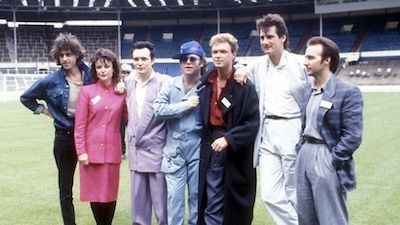
#1 - Forever Young: How Rock 'n' Roll Grew Up
BBC Documentaries - Season 2010 - Episode 35
Who could have predicted it? The Who in their sixties, singing 'Hope I die before I get old' to enthusiastic audiences spanning generations; Mick Jagger, with seven years already on his bus pass, snaking across the stage singing 'Let's spend the night together'; or a topless, leathery Iggy Pop growling 'Last year I was 21', before climbing the speaker stacks for a bit of mock fornication. Scenes that is at once incredibly odd, but undeniably powerful and inspiring. Forever Young takes a closer look at how rock 'n' roll has had to deal with the unthinkable - namely growing old. From its roots in the Fifties as a music made by young people for young people, to the 21st-century phenomena of the 'revival' and the 'comeback', the programme investigates what happens when the music refuses to die and its performers refuse to leave the stage. What happens when rock's youthful rebelliousness is delivered wrapped in wrinkles? Featuring contributions by Iggy Pop, Lemmy, Rick Wakeman, Suggs and Alison Moyet.
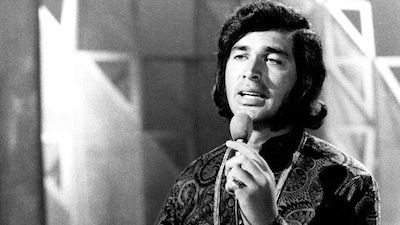
#2 - The Joy of Easy Listening
BBC Documentaries - Season 2011 - Episode 100
In-depth documentary investigation into the story of a popular music that is often said to be made to be heard, but not listened to. The film looks at easy listening's architects and practitioners, its dangers and delights, and the mark it has left on modern life. From its emergence in the 50s to its heyday in the 60s, through its survival in the 70s and 80s and its revival in the 90s and beyond, the film traces the hidden history of a music that has reflected society every bit as much as pop and rock - just in a more relaxed way. Invented at the dawn of rock 'n' roll, easy listening has shadowed pop music and the emerging teenage market since the mid-50s. It is a genre that equally soundtracks our modern age, but perhaps for a rather more 'mature' generation and therefore with its own distinct purpose and aesthetic. Contributors include Richard Carpenter, Herb Alpert, Richard Clayderman, Engelbert Humperdinck, Jimmy Webb, Mike Flowers, James Last and others.
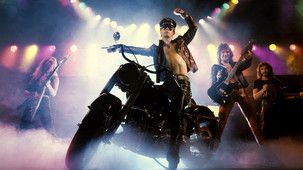
#3 - Heavy Metal Britannia
BBC Documentaries - Season 2010 - Episode 17
Nigel Planer narrates a documentary which traces the origins and development of British heavy metal from its humble beginnings in the industrialised Midlands to its proud international triumph. In the late 60s a number of British bands were forging a new kind of sound. Known as hard rock, it was loud, tough, energetic and sometimes dark in outlook. They didn't know it, but Deep Purple, Uriah Heep and, most significantly, Black Sabbath were defining what first became heavy rock and then eventually heavy metal. Inspired by blues rock, progressive rock, classical music and high energy American rock, they synthesised the sound that would inspire bands like Judas Priest to take metal even further during the 70s. By the 80s its originators had fallen foul of punk rock, creative stasis or drug and alcohol abuse. But a new wave of British heavy metal was ready to take up the crusade. With the success of bands like Iron Maiden, it went global. Contributors include Lemmy, Sabbath's Tony Iommi, Ian Gillan from Deep Purple, Judas Priest singer Rob Halford, Bruce Dickinson from Iron Maiden and Saxon's Biff Byford.
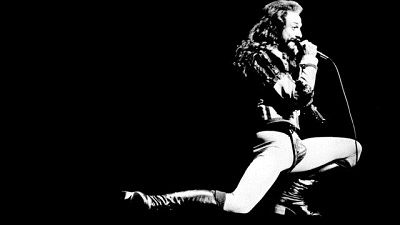
#4 - Prog Rock Britannia: An Observation in Three Movements
BBC Documentaries - Season 2009 - Episode 47
Documentary about progressive music and the generation of bands that were involved, from the international success stories of Yes, Genesis, ELP, King Crimson and Jethro Tull to the trials and tribulations of lesser-known bands such as Caravan and Egg. The film is structured in three parts, charting the birth, rise and decline of a movement famed for complex musical structures, weird time signatures, technical virtuosity and strange, and quintessentially English, literary influences. It looks at the psychedelic pop scene that gave birth to progressive rock in the late 1960s, the golden age of progressive music in the early 1970s, complete with drum solos and gatefold record sleeves, and the over-ambition, commercialisation and eventual fall from grace of this rarefied musical experiment at the hands of punk in 1977.
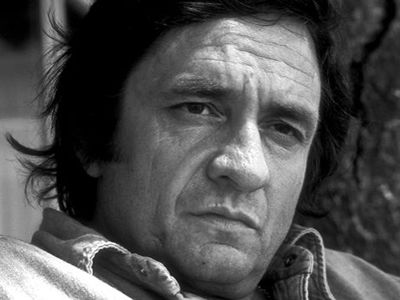
#5 - Johnny Cash: The Last Great American
BBC Documentaries - Season 2004 - Episode 2
Documentary profiling the life of legendary country music star Johnny Cash, who died in 2003 shortly after completing the retrospective Unearthed, a five-CD set of the acoustic performances with which he resurrected his career in the last decade of his life, and after losing his wife, June Carter Cash. This first major retrospective of Cash's life, times and music features contributions from his daughter Rosanne Cash and son John Carter Cash, his longtime manager Lou Robin and fellow musicians including Little Richard, Cowboy Jack Clement, Kris Kristofferson, Merle Haggard and Elvis Costello. Cash was the son of a poor sharecropper from Kingsland, Arkansas, who sang folk, spiritual and country songs to himself while picking cotton in the fields. In the 50s he signed to Sam Phillips' Sun Records, scored his first hits and was part of the 'Million Dollar Quartet' with Elvis Presley, Jerry Lee Lewis and Carl Perkins. In the 60s, he created his famous 'Man in Black' persona, and became a huge country star with hits like Folsom Prison Blues, Ring of Fire, I Walk the Line and A Boy Named Sue, while torn between drug dependency, hellraising and a powerful spirituality. Cash had long since established himself as a man of the people with his prison concerts beginning with an incendiary performance at San Quentin in 1958. He ended the decade by finally marrying June Carter - a member of hugely influential US country dynasty the Carter Family - launching his own national TV series from Nashville, befriending the Native American movement and opposing the war in Vietnam while playing concerts for the soldiers in the field. After tough times in the 80s, Cash reignited his career with a new young audience in the 90s when he recorded with rap-rock producer Rick Rubin.
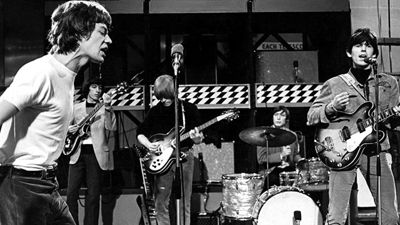
#6 - Blues Britannia: Can Blue Men Sing the Whites?
BBC Documentaries - Season 2009 - Episode 84
Documentary telling the story of what happened to blues music on its journey from the southern states of America to the heart of British pop and rock culture, providing an in-depth look at what this music really meant to a generation of kids desperate for an antidote to their experiences of living in post-war suburban Britain. Narrated by Nigel Planer and structured in three parts, the first, Born Under a Bad Sign, focuses on the arrival of American blues in Britain in the late 50s and the first performances here by such legends as Muddy Waters, Sonnie Terry and Brownie McGhee. Part two, Sittin' on Top of the World, charts the birth of the first British blues boom in the early 60s, spearheaded by the Rolling Stones and groups such as the Yardbirds, Manfred Mann, the Animals and the Pretty Things. The final section, Crossroads, looks at the next, more hardcore British blues boom of the mid-to-late 60s, with guitarists Eric Clapton and Peter Green and the international dominance of their respective bands, Cream and Fleetwood Mac.

#7 - Jools Holland: London Calling
BBC Documentaries - Season 2012 - Episode 123
Jools Holland embarks on a personal journey through the streets, historical landmarks, pubs, music halls and rock 'n' roll venues of London to uncover a history of the city through its songs, the people who wrote them and the Londoners who joined in the chorus. Unlike Chicago blues or Memphis soul, London has no one definitive sound. Its noisy history is full of grime, clamour, industry and countless different voices demanding to be heard. But there is a strain of street-wise realism that is forever present, from its world-famous nursery rhymes to its music hall traditions, and from the Broadside Ballad through to punk and beyond. Jools's investigation - at once probing and humorous - identifies the many ingredients of a salty tone that could be called 'the London sound' as he tracks through the centuries from the ballads of Tyburn Gallows to Broadside publishing in Seven Dials in the 18th century, to Wilton's Music Hall in the late 19th century, to the Caribbean sounds and styles that first docked at Tilbury with the Windrush in 1948, to his own conception to the strains of Humphrey Lyttelton at the 100 Club in 1957. Along the way, he meets musicians such as Ray Davies, Damon Albarn, Suggs, Roy Hudd, Lisa Hannigan, Joe Brown and Eliza Carthy who perform and talk about such classic songs as London Bridge is Falling Down, While London Sleeps, Knocked 'Em in the Old Kent Road, St James Infirmary Blues and Oranges and Lemons.
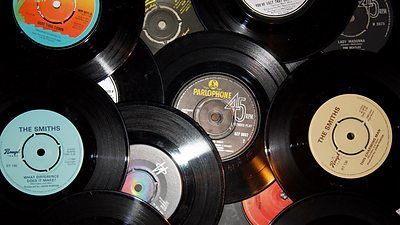
#8 - The Joy Of The Single
BBC Documentaries - Season 2012 - Episode 221
Documentary packed with memories, images and insights into the power of pop and rock's first and most abiding artefact - the seven inch, vinyl 45 rpm record; a small, perfectly-formed object that seems to contain the hopes, fears, sounds and experiences of our different generations. The viewer is invited on a journey of celebration from the 1950s rock n roll generation to the download kids of today, taking in classic singles from all manner of artists in each decade - from the smell of vinyl to the delights of the record label; from the importance of the record shop to the bittersweet brevity of the song itself; from stacking singles on a Dansette spindle to dropping the needle and thrilling to the intro. With contributions from Noddy Holder, Jack White, Richard Hawley, Suzi Quatro, Holly Johnson, Jimmy Webb, Pete Waterman, Norah Jones, Mike Batt, Graham Gouldman, Miranda Sawyer, Norman Cook, Trevor Horn, Neil Sedaka, Paul Morley, Rob Davies, Brian Wilson and Mike Love.
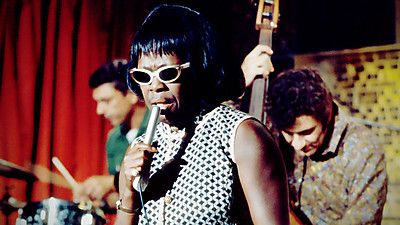
#9 - Queens of Jazz: The Joy and Pain of the Jazz Divas
BBC Documentaries - Season 2013 - Episode 92
Queens of Jazz is a celebration of some of the greatest female jazz singers of the 20th century. It takes an unflinching and revealing look at what it actually took to be a jazz diva during a turbulent time in America's social history - a time when battle lines were being constantly drawn around issues of race, gender and popular culture. This is a documentary about how these women triumphed - always at some personal cost - to become some of the greatest artists of the 20th century; women who chose singing above life itself because singing was their life.
#10 - Impressionism- Revenge of the Nice
Channel 4 (UK) Documentaries - Season 2004 - Episode 16
Matthew Collings will reappraise the Impressionists. The four stars are Courbet, Manet, Monet and Cezanne. In two hours their stories and their art will intertwine. Matt will unpack the principles of Impressionism - the strength of colour, the flatness, the patterning and the way in which ordinary life is pictured with startling truth - and argue that this is the best thing that has ever happened in modern art. He will also show that although the contemporary art world seemingly despises Impressionism it is only because of Impressionism that the avant-garde came to be. Written by Anonymous